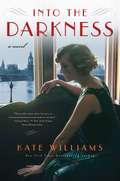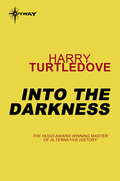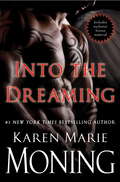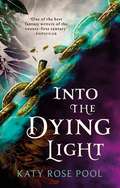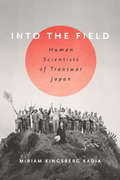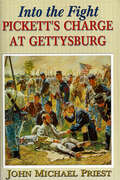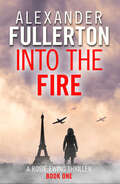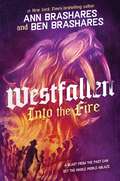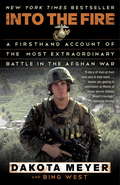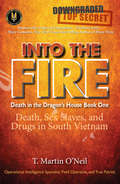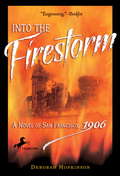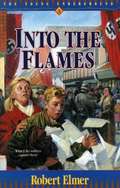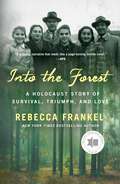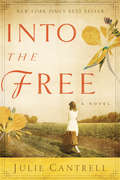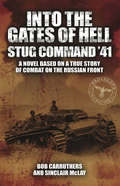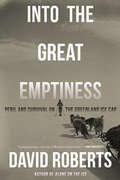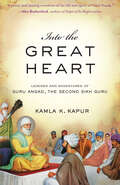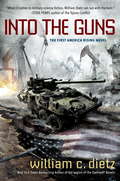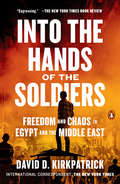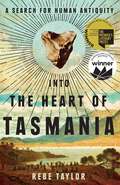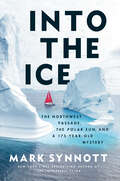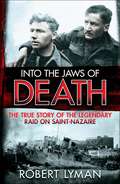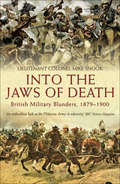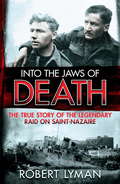- Table View
- List View
Into the Darkness: A Novel (The Storms of War #3)
by Kate WilliamsAlive with rich characters and evoking love, loss, and one woman's surprising strength during the tumult of the 1920s and 30s, the new novel in the “Storms of War” trilogy brings this acclaimed series to a dramatic conclusion. This scintillating third part of the “Storms of War” trilogy finds Celia in the glittering new city of 1920s New York, hunting for her son, Michael, who was taken from her at birth. In her desperation to find him, thwarted at every turn, she looks to the valiant girls of an underground flapper army and runaway boy with the biggest heart who knows New York inside and out for help. While in New York, she reconnects with Jonathan Corrigan—the best friend of her long-dead brother—and falls in love. In the hope of saving her family—and their home, Stoneythorpe—Celia sets up a business in New York. Her “Flapper Foods,” beautiful cans and jars of convenience food for the modern girl takes off. Then the Great Depression falls and everything seems lost. But the Depression brings Michael to her, and although Celia has lost her brother and her business, she has her child. They return to England, and Celia finds her family poor and in desperate need. She starts her business back up in a battle to save the house. But Celia's attempt to save her family—and keep everybody's secrets—is so all consuming, her business so absorbing that she doesn't see what's going around her. She refuses to see Tom when he begs to see his son. She doesn't see the advance of German rearming and nationalism, nor how it distresses her parents. And most of all, she doesn't see how Michael and his cousin, Lily, are becoming obsessed with each other. The adults attempt to separate the children. And this act tears the family apart. Michael and Lily disappear, World War II is coming, and Stoneythorpe, despite Celia’s efforts, must be sold. Jonathan realizes she is never coming back to the United States, and Tom is furious with her. It seems to Celia that she has lost everything, especially her son and niece. But the world around her is watching, and hope is on the horizon. But there are big decisions to make, and Celia will have to risk everything to save her family. Full of joy, wonder, bittersweet emotion, humor and redemption, Into the Darkness is filled with rich characters and a marvelous story about loss, love, new life, and one woman's surprising strength...
Into the Darkness: Book One of The Darkness Series (Darkness Ser. #Bk. 1)
by Harry TurtledoveThe death of a duke leads to a bloody war, as the King of Algarve moves swiftly to reclaim the duchy which was lost during a previous conflict. But country after country is pulled into war, as alliances reassert themselves and a hatred of difference escalates into rabid nationalism.
Into the Dreaming (Highlander #8)
by Karen Marie MoningBetween the Highlander and Fever worlds lies a place beyond imagining.This new edition of the novella contains more than 100 pages of bonus material, including:* a deleted scene from Kiss of the Highlander* a proposal for a never-published romance* an alternate opening version of The Dark Highlander* a sneak peek at art from the upcoming graphic novel Fever Moon For the first time in hardcover, here is #1 New York Times bestselling author Karen Marie Moning's novella Into the Dreaming, a tale of Highland fantasy, star-crossed lovers, and the timeless manipulation of the ancient, immortal Unseelie king. This is Moning at her romantic, funniest finest. Free him from his ice-borne hell . . . Stolen from his beloved home in the Highlands of Scotland, imprisoned in the Unseelie king's dark, frosty kingdom, Aedan MacKinnon endured centuries of torture before becoming the icy, emotionless Vengeance, the dark king's dispatcher of death and destruction in the mortal realm. And in his century you both may dwell . . . Aspiring romance novelist Jane Sillee has always believed that she was born in the wrong century, but she's managed to make a decent enough life for herself--if only she could stop having those recurring dreams about a man too perfect to exist. In the Dreaming you have loved him . . . Haunted every night of her life by a devastatingly sexy Highlander who comes to her while she sleeps, Jane tries to write him out of her head and heart. As a child he protected her, as a woman he loves her. Now in the Waking you must save him . . . When an ancient tapestry bearing the likeness of her beloved Highlander arrives on her doorstep, Jane is whisked back in time to fifteenth-century Scotland, to the castle of Dun Haakon on the isle of Skye, where she is given one chance to save her dream lover . . . or lose him forever to the Unseelie king. Caught in a deadly game between the light and dark courts of the Fae, Jane must find a way through the ice to the heart of her Highander. But will the love of one mortal woman be enough to defeat such ancient and ruthless immortal enemies?From the Hardcover edition.
Into the Dying Light: Book Three of The Age of Darkness (Age of Darkness)
by Katy Rose PoolCities will fall, hearts will shatter and a god will rise in the spectacular conclusion to Katy Rose Pool's Age of Darkness trilogy - a YA fantasy series packed with magic, prophecy and adventure.Praise for the The Age of Darkness:'A successful ending to a brilliant trilogy about human hope and connection' Kirkus'Masterful . . . Katy Rose Pool is a writer to watch' Sebastien De Castell, author of Traitor's Blade'Adventurous relic-hunting, mind-blowing twists, budding love and terrible betrayals feature in this multiple-narrator, character-driven study of power, agency and identity' Kirkus (starred review)'Unforgettable . . . feels both utterly original and like the best of classic fantasy' Tasha Suri, author of Empire of Sand'Katy Rose Pool combines lovable characters, a gorgeously tangible world and an intricate puzzle-box plot to create a story that will pull you inexorably toward the explosive end' Sarah Holland, New York Times bestselling author of Everless
Into the Field: Human Scientists of Transwar Japan
by Miriam L. Kingsberg KadiaIn the 1930s, a cohort of professional human scientists coalesced around a common and particular understanding of objectivity as the foundation of legitimate knowledge, and of fieldwork as the pathway to objectivity. Into the Field is the first collective biography of this cohort, evocatively described by one contemporary as the men of one age. At the height of imperialism, the men of one age undertook field research in territories under Japanese rule in pursuit of "objective" information that would justify the subjugation of local peoples. After 1945, amid the defeat and dismantling of Japanese sovereignty and under the occupation and tutelage of the United States, they returned to the field to create narratives of human difference that supported the new national values of democracy, capitalism, and peace. The 1968 student movement challenged these values, resulting in an all-encompassing attack on objectivity itself. Nonetheless, the legacy of the men of one age lives on in the disciplines they developed and the beliefs they established about human diversity.
Into the Fight: Pickett's Charge at Gettysburg
by John Michael PriestChallenging conventional views, stretching the minds of Civil War enthusiasts and scholars as only John Michael Priest can, Into the Fight is both a scholarly and a revisionist interpretation of the most famous charge in American history. Using a wide array of sources, ranging from the monuments on the Gettysburg battlefield to the accounts of the participants themselves, Priest here rewrites the conventional thinking about this unusually emotional, yet serious, moment in our Civil War. Starting with a fresh point of view, and with no axes to grind, Into the Fight challenges all interested in that stunning moment in history to rethink their assumptions. Worthwhile for its use of soldiers’ accounts, valuable for its forcing the reader to rethink the common assumptions about the charge, critics may disagree with this research, but they cannot ignore it.
Into the Fire (Rosie Ewing Spy Thrillers)
by Alexander FullertonThe first thriller in the WWII series featuring SOE agent Rosie Ewing, a &“meticulously researched war novel&” (Len Deighton). Summer 1943: Rosie Ewing is an agent of SOE—Special Operations Executive—and a &“pianist,&” Resistance slang for radio operator. Their average life expectancy is six weeks. But Rosie is brighter than most, well aware of the consequences of a second&’s carelessness, or bad luck, or treachery. Or a fellow agent crumbling under torture, naming names. Her brief is to set up a new network in occupied Rouen, where the old one has been blown and an agent is suspected of betrayal. If she gets there, that is. Landing from a gunboat on the Brittany coast, she must travel to Paris—carrying forged papers, a radio transceiver, and more than a million francs in cash . . . Frighteningly realistic, unbearably exciting, the Rosie Ewing spy thrillers come from Alexander Fullerton, acclaimed for his &“talent for combining historical fact with rousing fiction&” (Publishers Weekly). &“The tension rarely slackens and the setting is completely convincing.&” —The Times Literary Supplement &“His action passages are superb.&” —The Observer
Into the Fire (Westfallen)
by Ann Brashares Ben BrasharesFrom #1 New York Times bestselling Sisterhood of the Traveling Pants author Ann Brashares and her brother Ben Brashares comes the second book in the action-packed middle grade alternate history thriller trilogy that asks what present-day America would be like if Germany had won World War II.Former best friends Henry, Frances, and Lukas thought they&’d managed to restore history to its original path after their antics with a time-bending radio went awry. But they&’re still trapped in Westfallen, the version of present-day America where the Axis won WWII, living an alternate—and much darker—version of their lives. Henry has to work at the Home for Incurables, Lukas is on hard labor all day, and only Frances, whose parents are members of the Nazi elite, gets to go to school and move freely. And since they and their friends in 1944 destroyed the radio, they have to find cruder and ever-more-desperate ways to communicate across time. Frances uses her privilege in Westfallen to gather as much information as she can, while Henry tries to turn Lukas into a local baseball hero to save him from being sent away to a work camp. But the deeper the three friends and their 1944 counterparts dig into how Westfallen came to be, the more they begin to attract unwanted attention from people with a vested interest in making sure this version of history becomes permanent…at any cost.
Into the Fire: A Firsthand Account of the Most Extraordinary Battle in the Afghan War
by Bing West Dakota Meyer"The story of what Dakota did . . . will be told for generations."--President Barack Obama, from remarks given at Meyer's Medal of Honor ceremonyIn the fall of 2009, Taliban insurgents ambushed a patrol of Afghan soldiers and Marine advisors in a mountain village called Ganjigal. Firing from entrenched positions, the enemy was positioned to wipe out one hundred men who were pinned down and were repeatedly refused artillery support. Ordered to remain behind with the vehicles, twenty-one year-old Marine corporal Dakota Meyer disobeyed orders and attacked to rescue his comrades. With a brave driver at the wheel, Meyer stood in the gun turret exposed to withering fire, rallying Afghan troops to follow. Over the course of the five hours, he charged into the valley time and again. Employing a variety of machine guns, rifles, grenade launchers, and even a rock, Meyer repeatedly repulsed enemy attackers, carried wounded Afghan soldiers to safety, and provided cover for dozens of others to escape--supreme acts of valor and determination. In the end, Meyer and four stalwart comrades--an Army captain, an Afghan sergeant major, and two Marines--cleared the battlefield and came to grips with a tragedy they knew could have been avoided. For his actions on that day, Meyer became the first living Marine in three decades to be awarded the Medal of Honor. Into the Fire tells the full story of the chaotic battle of Ganjigal for the first time, in a compelling, human way that reveals it as a microcosm of our recent wars. Meyer takes us from his upbringing on a farm in Kentucky, through his Marine and sniper training, onto the battlefield, and into the vexed aftermath of his harrowing exploits in a battle that has become the stuff of legend. Investigations ensued, even as he was pitched back into battle alongside U.S. Army soldiers who embraced him as a fellow grunt. When it was over, he returned to the States to confront living with the loss of his closest friends. This is a tale of American values and upbringing, of stunning heroism, and of adjusting to loss and to civilian life. We see it all through Meyer's eyes, bullet by bullet, with raw honesty in telling of both the errors that resulted in tragedy and the resolve of American soldiers, U.S. Marines, and Afghan soldiers who'd been abandoned and faced certain death. Meticulously researched and thrillingly told, with nonstop pace and vivid detail, Into the Fire is the unvarnished story of a modern American hero.Praise for Into the Fire "A story of men at their best and at their worst . . . leaves you gaping in admiration at Medal of Honor winner Dakota Meyer's courage."--National Review "Meyer's dazzling bravery wasn't momentary or impulsive but deliberate and sustained."--The Wall Street Journal "[A] cathartic, heartfelt account . . . Combat memoirs don't get any more personal."--Kirkus Reviews "A great contribution to the discussion of an agonizingly complex subject."--The Virginian-Pilot "Black Hawk Down meets Lone Survivor."--Library Journalm the Hardcover edition.
Into the Fire: Death, Sex Slaves, and Drugs in South Vietnam (Death in the Dragon’s House #1)
by T. Martin O’neilThe cover of darkness was pulled back by the NODS scopes in their hands. The enemy had no idea what was about to befall them. With the rush of wings of dragons, the sounds of M-14s, M-870 shotguns, M-16's and grenades spoke the finality of death. This gave the human pack mules a taste of what would continue to reign upon them in the House of the Dragon. North and South Vietnam were at war. Indeed, all of Southeast Asia was at war. Due to national commitments, the U.S. military was drawn into the fray. Members of the elite Navy SEALS performed operations from counter-narcotics, counter-human trafficking and even counter piracy. These men placed their lives on the line daily as true humanitarians. Seen through the eyes of attached Naval Intelligence operatives, their stories can now be revealed. These operations, specific missions, even their love stories, are recounted in Into the Fire.
Into the Firestorm
by Deborah HopkinsonThe terror of the 1906 disaster is brought powerfully alive in this fast-paced tale of 12-year-old orphan Nick Dray who runs away, leaving Texas for the bright lights of San Francisco.
Into the Flames (The Young Underground #3)
by Robert ElmerThe Nazis were after them, and there was nowhere to hide. INTO THE FLAMES. Twelve-year-old Peter and Elise Anderson have secretly taken on assignment--delivering illegal newspapers for the Danish Underground! Bringing news of freedom and deliverance to the people of Denmark seems like the perfect way to help fight the Nazis--until soldiers nearly sabotage their mission. Is class troublemaker Keld Poulsen spying on Peter and Elise? Will he report them to the Nazis? Armed with secret code names, Peter and Elise must elude Keld in spite of his threats. When the Nazis plot to raid newspaper headquarters, the twins rush to help their friends in the Underground--but will they find themselves cornered by German soldiers?
Into the Forest: A Holocaust Story of Survival, Triumph, and Love
by Rebecca FrankelOne family’s inspiring true story of love, escape, and survival"An uplifting tale, suffused with a karmic righteousness that is, at times, exhilarating." —Wall Street Journal "A gripping narrative that reads like a page turning thriller novel." —NPRIn the summer of 1942, the Rabinowitz family narrowly escaped the Nazi ghetto in their Polish town by fleeing to the forbidding Bialowieza Forest. They miraculously survived two years in the woods—through brutal winters, Typhus outbreaks, and merciless Nazi raids—until they were liberated by the Red Army in 1944. After the war they trekked across the Alps into Italy where they settled as refugees before eventually immigrating to the United States.During the first ghetto massacre, Miriam Rabinowitz rescued a young boy named Philip by pretending he was her son. Nearly a decade later, a chance encounter at a wedding in Brooklyn would lead Philip to find the woman who saved him. And to discover her daughter Ruth was the love of his life.From a little-known chapter of Holocaust history, one family’s inspiring true story.
Into the Free
by Julie CantrellJust a girl. The only one strong enough to break the cycle.In Depression-era Mississippi, Millie Reynolds longs to escape the madness that marks her world. With an abusive father and a "nothing mama," she struggles to find a place where she really belongs.For answers, Millie turns to the Gypsies who caravan through town each spring. The travelers lead Millie to a key that unlocks generations of shocking family secrets. When tragedy strikes, the mysterious contents of the box give Millie the tools she needs to break her family's longstanding cycle of madness and abuse. Through it all, Millie experiences the thrill of first love while fighting to trust the God she believes has abandoned her. With the power of forgiveness, can Millie finally make her way into the free?Saturated in Southern ambiance and written in the vein of other Southern literary bestsellers like The Help by Kathryn Stockett and Crooked Letter, Crooked Letter by Tom Franklin, Julie Cantrell has created in Into the Free--now a New York Times Best Seller--a story that will sweep you away long after the novel ends.
Into the Gates of Hell: A Novel Based on a True Story of Combat on the Russian Front
by Bob Carruthers Sinclair McLay03:15, 22nd June 1941 - Barbarossa is unleashed and Kampfgruppe von Schroif are right there at the cutting edge of the battle for Russia. Thrown into action against the fortress of Brest-Litovsk, von Schroif and his crew drive a new weapon into battle - the legendary Sturmgeschtz. However, even with this latest armoured marvel there is hard fighting as the Reds dig in and doggedly defend the island fortress to the last man.rnrnPenetrating , authentic and stunning in its detail, the long awaited prequel to the highly acclaimed 'Tiger Command!' is a powerful addition to the series. Based on a true story of combat on the Eastern Front, this atmospheric new novel puts the reader right into the action and unveils the story of how a legend was forged in the heat of the first great battle of the campaign.rnrnWritten by Emmy AwardTM winning writer Bob Carruthers and newcomer Sinclair McLay and edited by Mark Farr, this much anticipated Eastern Front novel also explores the dark underside of war as von Schroif is faced with the malevolent presence of Oskar Dirlewanger.
Into the Great Emptiness: Peril And Survival On The Greenland Ice Cap
by David RobertsA Library Journal Best Book of 2022 in Science and Technology “A gripping saga—and one of Roberts’s finest books.” —Jon Krakauer The riveting story of one of the greatest but least-known sagas in the history of exploration. By 1930, no place in the world was less well explored than Greenland. The native Inuit had occupied the relatively accessible west coast for centuries. The east coast, however, was another story. In August 1930, Henry George Watkins (nicknamed “Gino”), a twenty-three-year-old British explorer, led thirteen scientists and explorers on an ambitious expedition to the east coast of Greenland and into its vast and forbidding interior to set up a permanent meteorological base on the icecap, 8,200 feet above sea level. The Ice Cap Station was to be the anchor of a transpolar route of air travel from Europe to North America. The weather on the ice cap was appalling. Fierce storms. Temperatures plunging lower than –50° Fahrenheit in the winter. Watkins’s scheme called for rotating teams of two men each to monitor the station for two months at a time. No one had ever tried to winter over in that hostile landscape, let alone manage a weather station through twelve continuous months. Watkins was younger than anyone under his command. But he had several daring trips to the Arctic under his belt and no one doubted his judgement. The first crisis came in the fall when a snowstorm stranded a resupply mission halfway to the top for many weeks. When they arrived at the ice cap, there were not enough provisions and fuel for another two-man shift, so the station would have to be abandoned. Then team member August Courtauld made an astonishing offer. To enable the mission to go forward, he would monitor the station solo through the winter. When a team went up in March to relieve Courtauld, after weeks of brutal effort to make the 130-mile journey, they could find no trace of him or the station. By the end of March, Courtauld’s situation was desperate. He was buried under an immovable load of frozen snow and was disastrously short on supplies. On April 21, four months after Courtauld began his solitary vigil, Gino Watkins set out inland with two companions to find and rescue him. David Roberts, “veteran mountain climber and chronicler of adventures” (Washington Post), draws on firsthand accounts and archival materials to tell the story of this daring expedition and of the epic survival ordeal that ensued.
Into the Great Heart: Legends and Adventures of Guru Angad, the Second Sikh Guru
by Kamla A. KapurThe author of The Singing Guru shares the journey of Bhai Lehna to becoming Guru Angad in a tale that’s part history, legend, and fiction.Into the Great Heart carries forward and concludes the stories of Guru Nanak and Bhai Mardana, his favorite minstrel, from the first volume of the Sikh Founder Series, The Singing Guru. History, legend, and fiction merge to populate this book with fascinating personalities from Sikh history. Pivotal to this narrative are forgotten female luminaries such as Guru Nanak’s wife, Mata Sulakhni, his sister, Bebe Nanaki, Bhai Lehna’s wife, Khivi, and daughter, Amro. Brought to the foreground, their wisdom and insights as they overcome obstacles to spiritual growth embody the basic tenets of Sikhism in everyday living. They enhance Guru Nanak and Bhai Lehna’s tale with their diverse approach to life.Filled with captivating characters that enrich the tapestry of this compelling narrative, Into the Great Heart is a must-read for anyone who loves a rich story about human nature in its search for spiritual awareness.“A poetic and moving evocation of the life and spirit of Guru Nanak.” —Alex Rutherford, author of Empire of the Moghul series
Into the Guns
by William C. DietzFrom the New York Times bestselling author of The Legion of the Damned® Novels and The Mutant Files comes the first novel in a post-apocalyptic military science fiction series about America rising from the ashes of a global catastrophe...On May Day, 2018, sixty meteors entered Earth's atmosphere and exploded around the globe with a force greater than a nuclear blast. Earthquakes and tsunamis followed. Then China attacked Europe, Asia, and the United States in the belief the disaster was an act of war. Washington D.C. was a casualty of the meteor onslaught that decimated the nation's leadership and left the surviving elements of the armed forces to try and restore order as American society fell apart. As refugees across America band together and engage in open warfare with the military over scarce resources, a select group of individuals representing the surviving corporate structure makes a power play to rebuild the country in a free market image as The New Confederacy...From the Hardcover edition.
Into the Hands of the Soldiers: Freedom and Chaos in Egypt and the Middle East
by David D. KirkpatrickA candid narrative of how and why the Arab Spring sparked, then failed, and the truth about America's role in that failure and the subsequent military coup that put Sisi in power--from the Middle East correspondent of the New York Times.In 2011, Egyptians of all sects, ages, and social classes shook off millennia of autocracy, then elected a Muslim Brother as president. The 2013 military coup replaced him with a new strongman, Abdel Fattah el-Sisi, who has cracked down on any dissent or opposition with a degree of ferocity Mubarak never dared. New York Times correspondent David D. Kirkpatrick arrived in Egypt with his family less than six months before the uprising first broke out in 2011, looking for a change from life in Washington, D.C. As revolution and violence engulfed the country, he received an unexpected and immersive education in the Arab world.For centuries, Egypt has set in motion every major trend in politics and culture across the Middle East, from independence and Arab nationalism to Islamic modernism, political Islam, and the jihadist thought that led to Al Qaeda and ISIS. The Arab Spring revolts of 2011 spread from Cairo, and now Americans understandably look with cynical exasperation at the disastrous Egyptian experiment with democracy. They fail to understand the dynamic of the uprising, the hidden story of its failure, and Washington's part in that tragedy. In this candid narrative, Kirkpatrick lives through Cairo's hopeful days and crushing disappointments alongside the diverse population of his new city: the liberal yuppies who first gathered in Tahrir Square; the persecuted Coptic Christians standing guard around Muslims at prayer during the protests; and the women of a grassroots feminism movement that tried to seize its moment. Juxtaposing his on-the-ground experience in Cairo with new reporting on the conflicts within the Obama administration, Kirkpatrick traces how authoritarianism was allowed to reclaim Egypt after thirty months of turmoil.Into the Hands of the Soldiers is a heartbreaking story with a simple message: The failings of decades of autocracy are the reason for the chaos we see today across the Arab world. Because autocracy is the problem, more autocracy is unlikely to provide a durable solution. Egypt, home to one in four Arabs, is always a bellwether. Understanding its recent history is essential to understanding everything taking place across the region today--from the terrorist attacks in the North Sinai and Egypt's new partnership with Israel to the bedlam in Syria and Libya.
Into the Heart of Tasmania: A Search For Human Antiquity
by Rebe TaylorIn 1908 English gentleman, Ernest Westlake, packed a tent, a bicycle and forty tins of food and sailed to Tasmania. On mountains, beaches and in sheep paddocks he collected over 13,000 Aboriginal stone tools. Westlake believed he had found the remnants of an extinct race whose culture was akin to the most ancient Stone Age Europeans. But in the remotest corners of the island Westlake encountered living Indigenous communities.Into the Heart of Tasmania tells a story of discovery and realisation. One man's ambition to rewrite the history of human culture inspires an exploration of the controversy stirred by Tasmanian Aboriginal history. It brings to life how Australian and British national identities have been fashioned by shame and triumph over the supposed destruction of an entire race. To reveal the beating heart of Aboriginal Tasmania is to be confronted with a history that has never ended.
Into the Ice: The Northwest Passage, the Polar Sun, and a 175-Year-Old Mystery
by Mark SynnottNew York Times bestselling author Mark Synnott has climbed with Alex Honnold. He&’s scaled Mount Everest. He's pioneered big-wall first ascents, including the north-west face of the mile-high Great Trango Tower, and skied monster first descents. But in 2022, he realized there was a dream he&’d yet to achieve: to sail the Northwest Passage in his own boat-- a feat only four hundred or so sailors have ever accomplished—and in doing so, try to solve the mystery of what happened to legendary nineteenth-century explorer Sir John Franklin and his ships, HMS Erebus and Terror. Only a few hundred vessels have ever transited the Northwest Passage, and substantially fewer have done so in a fiberglass-hulled boat like Polar Sun. But Mark was determined to return to the Arctic, where he cut his teeth as a young climber, and in the process investigate one of the great mysteries of exploration: What really happened to Sir John Franklin and his entire 128-man crew, which disappeared into these ice-strewn waters 175 years ago? In this pulse-pounding travelogue, Mark Synnott paints a vivid portrait of the Arctic, which is currently warming twice as fast as any other part of our planet. He weaves its history and people into the first-person account of his epic journey through the Northwest Passage, searching for Franklin's tomb along the way-- all while trying to avoid a similar fate. In Into the Ice, Mark and his crew race against time and treacherous storms in search of answers to the greatest mystery of all time: What is it that drives someone to risk it all in the name of exploration?
Into the Jaws of Death
by Robert LymanIt is the night of March 28, 1942. Royal Navy and British commandos are poised to assault the German-held port of Saint-Nazaire in what will be one of the most audacious and daring raids of the Second World War. The plan is simple: to drive an old destroyer, packed with three tons of explosives, at full speed into the outer gate of the Normandie dock. The aim is to destroy the base from which the formidable battleship Tirpitz would be able to devastate the convoys supplying Britain from the United States. "Operation Chariot" was to be dramatically successful, but at a great cost. Fewer than half the men who went on the mission returned. In recognition of their valor, eighty-nine decorations were awarded, including five Victoria Crosses. Into the Jaws of Death is the true story of how the decisive courage of a small group of men changed the course of the war.
Into the Jaws of Death: British Military Blunders, 1879–1900
by Mike SnookBetween the Crimean War and the dawn of the 20th century, the British Army was almost continuously engaged in one corner of the globe or another, in military operations famously characterized by Kipling as the 'savage wars of peace'. In his new work on the most dramatic Victorian campaigns Mike Snook bring's the most dramatic clashes of the age of empire back to life. Here focuses closely on defeat and disaster—the occasions when things went badly awry for the British. The names of these great battles—Isandlwana, Maiwand, Majuba Hill, Khartoum, Colenso, Spion Kop and Magersfontein still resonate down through the ages. In a meticulously researched military history, the author exposes the true and sometimes embarrassing causes of defeat. Overstretch, political meddling, military incompetence and petty jealousy all played their part. Above all else, however, these are dramatic and perceptive accounts of mere mortal men struggling to deal with the often overpowering dynamics and horrors of 19th-century warfare on the fringes of Empire.
Into the Jaws of Death: The True Story of the Legendary Raid on Saint-Nazaire
by Robert LymanOn the night of 28 March 1942 the Royal Navy and British commandos assaulted the German-held French Atlantic port of Saint-Nazaire in one of the most audacious raids of the Second World War. Their plan was simple: to drive an old destroyer packed with three tons of explosive at full speed into the outer gate of the Normandie dock. Destroying this would deny the formidable Tirpitz battleship, currently lurking menacingly in the Norwegian fjords, a base from which it could inflict devastation upon the convoys supplying Britain from the United States. 'Operation Chariot' was dramatically successful, but at a great cost. Fewer than half the men who went on the mission returned. In recognition of their extraordinary bravery, eighty-nine decorations were awarded, including five Victoria Crosses. Into the Jaws of Death is a gripping story of high daring that demonstrates how the decisive courage of a small group of men changed the course of the war.
Into the Jaws of Death: The True Story of the Legendary Raid on Saint-Nazaire
by Robert LymanOn the night of 28 March 1942 the Royal Navy and British commandos assaulted the German-held French Atlantic port of Saint-Nazaire in one of the most audacious raids of the Second World War. Their plan was simple: to drive an old destroyer packed with three tons of explosive at full speed into the outer gate of the Normandie dock. Destroying this would deny the formidable Tirpitz battleship, currently lurking menacingly in the Norwegian fjords, a base from which it could inflict devastation upon the convoys supplying Britain from the United States. 'Operation Chariot' was dramatically successful, but at a great cost. Fewer than half the men who went on the mission returned. In recognition of their extraordinary bravery, eighty-nine decorations were awarded, including five Victoria Crosses. Into the Jaws of Death is a gripping story of high daring that demonstrates how the decisive courage of a small group of men changed the course of the war.
